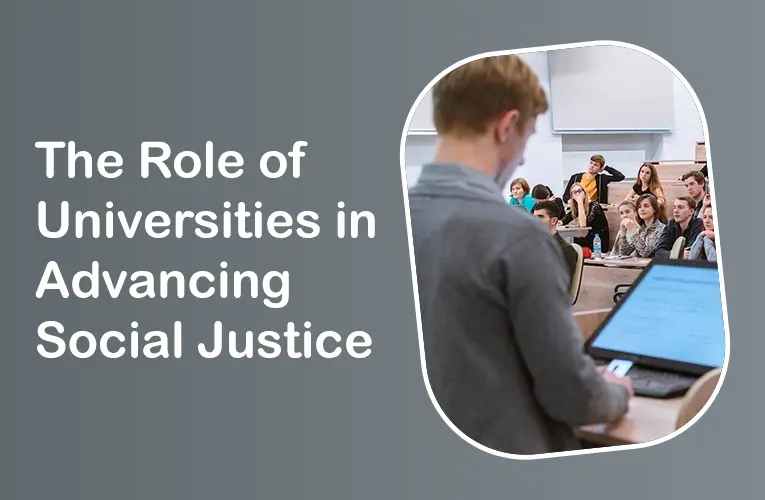The Role of Universities in Advancing Social Justice
Introduction
In recent years, universities have increasingly been recognized not only as centers for academic excellence but also as pivotal players in advancing social justice. The evolving landscape of higher education underscores the crucial role institutions play in addressing societal inequities, fostering inclusive environments, and leading transformative change. This article delves into the multifaceted role of universities in promoting social justice, exploring their initiatives, challenges, and impact.
1. Understanding Social Justice in the Context of Higher Education
1.1 Defining Social Justice
Social justice encompasses the fair distribution of resources, opportunities, and privileges within a society. It aims to address systemic inequalities and ensure that all individuals, regardless of their background, have equitable access to opportunities and resources.
1.2 The Role of Universities in Social Justice
Universities, as institutions of higher learning and research, have a unique position to influence social change. They are not only responsible for educating future leaders but also for setting an example in promoting equity, diversity, and inclusion.
2. Universities as Agents of Change
2.1 Curriculum Development and Inclusive Education
To promote social justice, universities are increasingly integrating diversity and inclusion into their curricula. This includes developing courses that address social inequalities, historical injustices, and cultural competence. By providing students with a comprehensive understanding of these issues, universities prepare them to be informed and empathetic leaders.
2.2 Research and Advocacy
Universities are hubs for research that can drive social change. Faculty and students engage in research on topics related to social justice, including racial and gender inequality, economic disparity, and environmental justice. This research often informs policy and advocacy efforts, contributing to societal transformation.
2.3 Campus Diversity and Inclusion Initiatives
Creating a diverse and inclusive campus environment is fundamental to advancing social justice. Universities implement various programs to support underrepresented groups, including scholarships, mentorship programs, and diversity training. These initiatives help ensure that all students have equal opportunities to succeed.
3. Challenges and Criticisms
3.1 Addressing Systemic Inequities Within Institutions
Despite their efforts, universities often face challenges related to systemic inequities within their own institutions. Issues such as faculty and student diversity, salary disparities, and unequal access to resources can hinder progress toward social justice.
3.2 Balancing Free Speech and Social Responsibility
Universities must navigate the delicate balance between upholding free speech and promoting a safe, inclusive environment. Controversial topics and speakers can provoke debates about the limits of free expression and the responsibilities of educational institutions in fostering respectful discourse.
4. Case Studies of Universities Leading in Social Justice
4.1 University of California, Berkeley
The University of California, Berkeley, has been at the forefront of social justice advocacy, with programs and initiatives focusing on racial equity, gender inclusivity, and environmental sustainability. Their research centers and community outreach programs exemplify their commitment to social justice.
4.2 Harvard University
Harvard University’s efforts in advancing social justice include comprehensive diversity and inclusion programs, such as the Office for Diversity, Inclusion, and Belonging. Their research on social justice issues contributes to broader societal discussions and policy changes.
5. Future Directions and Opportunities
5.1 Enhancing Community Engagement
Universities can further their impact on social justice by strengthening partnerships with local communities. Engaging in community-based research and service-learning projects allows students and faculty to address real-world issues and collaborate on solutions.
5.2 Embracing Technological Advancements
Leveraging technology can enhance educational access and equity. Online learning platforms and digital resources can help reach underserved populations and provide flexible learning opportunities.
5.3 Promoting Global Perspectives
Universities should expand their focus to include global social justice issues, such as international human rights, global health disparities, and climate justice. A global perspective enriches students’ understanding and prepares them to address worldwide challenges.
Conclusion
Universities play a pivotal role in advancing social justice by educating future leaders, conducting impactful research, and fostering inclusive environments. While challenges remain, the commitment of higher education institutions to promoting equity and addressing systemic inequalities is essential for driving societal change. As universities continue to evolve, their contributions to social justice will be critical in shaping a more equitable and just world.










